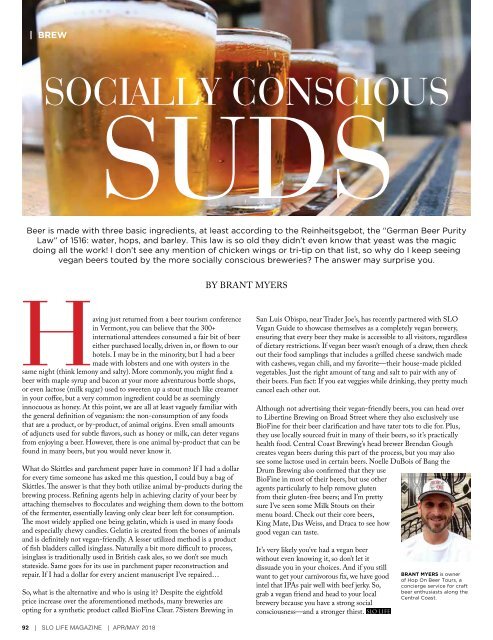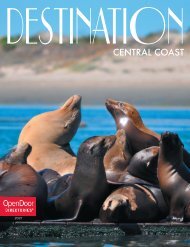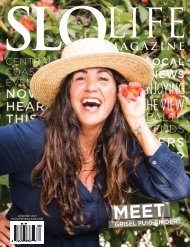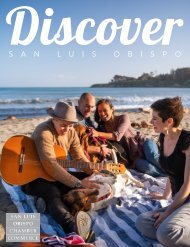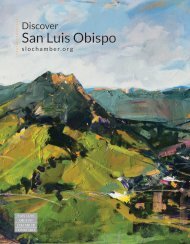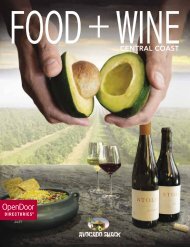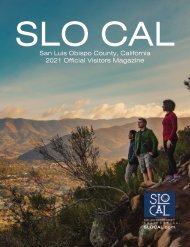Create successful ePaper yourself
Turn your PDF publications into a flip-book with our unique Google optimized e-Paper software.
| BREW<br />
SOCIALLY CONSCIOUS<br />
SUDS<br />
Beer is made with three basic ingredients, at least according to the Reinheitsgebot, the “German Beer Purity<br />
Law” of 1516: water, hops, and barley. This law is so old they didn’t even know that yeast was the magic<br />
doing all the work! I don’t see any mention of chicken wings or tri-tip on that list, so why do I keep seeing<br />
vegan beers touted by the more socially conscious breweries? The answer may surprise you.<br />
BY BRANT MYERS<br />
Having just returned from a beer tourism conference<br />
in Vermont, you can believe that the 300+<br />
international attendees consumed a fair bit of beer<br />
either purchased locally, driven in, or flown to our<br />
hotels. I may be in the minority, but I had a beer<br />
made with lobsters and one with oysters in the<br />
same night (think lemony and salty). More commonly, you might find a<br />
beer with maple syrup and bacon at your more adventurous bottle shops,<br />
or even lactose (milk sugar) used to sweeten up a stout much like creamer<br />
in your coffee, but a very common ingredient could be as seemingly<br />
innocuous as honey. At this point, we are all at least vaguely familiar with<br />
the general definition of veganism: the non-consumption of any foods<br />
that are a product, or by-product, of animal origins. Even small amounts<br />
of adjuncts used for subtle flavors, such as honey or milk, can deter vegans<br />
from enjoying a beer. However, there is one animal by-product that can be<br />
found in many beers, but you would never know it.<br />
What do Skittles and parchment paper have in common? If I had a dollar<br />
for every time someone has asked me this question, I could buy a bag of<br />
Skittles. The answer is that they both utilize animal by-products during the<br />
brewing process. Refining agents help in achieving clarity of your beer by<br />
attaching themselves to flocculates and weighing them down to the bottom<br />
of the fermenter, essentially leaving only clear beer left for consumption.<br />
The most widely applied one being gelatin, which is used in many foods<br />
and especially chewy candies. Gelatin is created from the bones of animals<br />
and is definitely not vegan-friendly. A lesser utilized method is a product<br />
of fish bladders called isinglass. Naturally a bit more difficult to process,<br />
isinglass is traditionally used in British cask ales, so we don’t see much<br />
stateside. Same goes for its use in parchment paper reconstruction and<br />
repair. If I had a dollar for every ancient manuscript I’ve repaired…<br />
So, what is the alternative and who is using it? Despite the eightfold<br />
price increase over the aforementioned methods, many breweries are<br />
opting for a synthetic product called BioFine Clear. 7Sisters Brewing in<br />
San Luis Obispo, near Trader Joe’s, has recently partnered with <strong>SLO</strong><br />
Vegan Guide to showcase themselves as a completely vegan brewery,<br />
ensuring that every beer they make is accessible to all visitors, regardless<br />
of dietary restrictions. If vegan beer wasn’t enough of a draw, then check<br />
out their food samplings that includes a grilled cheese sandwich made<br />
with cashews, vegan chili, and my favorite—their house-made pickled<br />
vegetables. Just the right amount of tang and salt to pair with any of<br />
their beers. Fun fact: If you eat veggies while drinking, they pretty much<br />
cancel each other out.<br />
Although not advertising their vegan-friendly beers, you can head over<br />
to Libertine Brewing on Broad Street where they also exclusively use<br />
BioFine for their beer clarification and have tater tots to die for. Plus,<br />
they use locally sourced fruit in many of their beers, so it’s practically<br />
health food. Central Coast Brewing’s head brewer Brendan Gough<br />
creates vegan beers during this part of the process, but you may also<br />
see some lactose used in certain beers. Noelle DuBois of Bang the<br />
Drum Brewing also confirmed that they use<br />
BioFine in most of their beers, but use other<br />
agents particularly to help remove gluten<br />
from their gluten-free beers; and I’m pretty<br />
sure I’ve seen some Milk Stouts on their<br />
menu board. Check out their core beers,<br />
King Mate, Das Weiss, and Draca to see how<br />
good vegan can taste.<br />
It’s very likely you’ve had a vegan beer<br />
without even knowing it, so don’t let it<br />
dissuade you in your choices. And if you still<br />
want to get your carnivorous fix, we have good<br />
intel that IPAs pair well with beef jerky. So,<br />
grab a vegan friend and head to your local<br />
brewery because you have a strong social<br />
consciousness—and a stronger thirst. <strong>SLO</strong> <strong>LIFE</strong><br />
BRANT MYERS is owner<br />
of Hop On Beer Tours, a<br />
concierge service for craft<br />
beer enthusiasts along the<br />
Central Coast.<br />
92 | <strong>SLO</strong> <strong>LIFE</strong> MAGAZINE | APR/MAY <strong>2018</strong>


